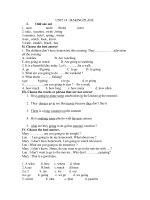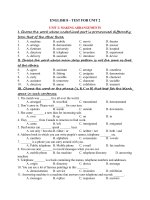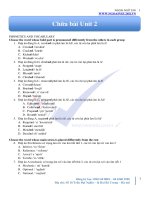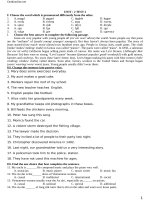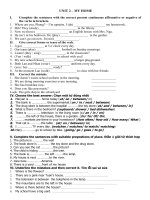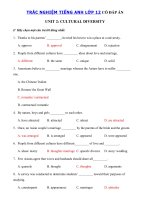bài tập unit 2 making arrangment
Bạn đang xem bản rút gọn của tài liệu. Xem và tải ngay bản đầy đủ của tài liệu tại đây (129.8 KB, 10 trang )
ENGLISH 8 – TEST FOR UNIT 2
UNIT 2: MAKING ARRANGEMENTS
I. Choose the word whose underlined part is pronounced differently
from that of the other three.
1.
A. machine
B. mobile
C. movie
2.
A. arrange
B. demonstrate
C. transmit
3.
A. furniture
B. university
C. patient
4.
A. directory
B. telephone
C. invention
5.
A. delivery
B. assistant
C. introduce
II. Choose the word whose main stress pattern is not
of the others.
6.
A. agree
7.
A. transmit
8.
A. curly
9.
A. assistant
10.
A. directory
III. Choose the word
D. theater
D. answer
D. hospital
D. experiment
D. device
the same as that
B. assistant
C. arrange
D. countless
B. fishing
C. emigrate
D. demonstrate
B. sociable
C. experiment
D. character
B. tomorrow
C. character
D. sociable
B. annoy
C. exhibition
D. transmit
or the phrase (A, B, C or D) that best fits the blank
space in each sentences.
1. The match was _______ live all over the world.
A. arranged
B. travelled
C. transmitted
D. demonstrated
2. Don’t come in. Please wait _______ for your turn.
A. upstairs
B. inside
C. outside
D. downstairs.
3. She came _______ a new idea for increasing sale.
A. over
B. up
C. on
D. in
4. They _______ from Canada to America to find work.
A. came
B. left
C. immigrated
D. emigrated
5. Deaf-mutes can _______ speak _______ hear.
A. not only / but also B. either / or
C. neither / nor
D. both / and
6. Address book in which you can write people’s names, telephone _______ etc.
A. numbers
B. alphabets
C. consonants
D. vowels
7. _______ is a phone you can carry around with you.
A. Public telephone B. Mobile phone
C. e-mail
D. fax machine
8. You can use a(n) _______ to record messages when you are out.
A. mobile phone
B. fax machine
C. telephone directory
D. answering
machine
9. Telephone _______ is a book containing the names, telephone numbers and addresses.
A. origin
B. directory
C. device
D. message
10. You can see a lot of famous paintings in this _______.
A. demonstration
B. service
C. invention
D. exhibition
11. Answering machine is a machine that answers your telephone and records _______.
A. messages
B. replies
C. responses
D. answers
12. Movie theater is a _______ in which movies are shown.
A. building
B. apartment
C. flat
D. cottage
rd
13. Alexander Graham Bell was born _______ March 3 1847.
A. at
B. on
C. during
D. in
14. Would you like _______ a message?
A. to leave
B. leave
C. leaving
D. left
15. Fax machine is _______ used for sending and receiving copies of documents.
A. a device
B. an equipment
C. a apartment
D. an appliance
16. Public _______ is a phone which is available for people in general to use.
A. telephone
B. television
C. telegraph
D. telegram
17. I _______ a quick phone call. Can you wait for me?
A. make
B. am going to make C. will make
D. made
18. Can you give her a message for me - _______.
A. Yes, certainly
B. Thank you
C. I don’t know
D. You’re welcome
19. What’s the date today?
A. It’s Thursday
B. The third I think C. It’s Monday
D. I’m 22 today
20. She said Mr. Minh call reach us _______ 8645 132 after dinner.
A. for
B. in
C. on
D. at
IV. Use the correct word form.
1. We’ll make ______________ for the meeting.
(Arrange)
2. Your order is ready for ______________.
(Deliver)
3. We are thinking of ______________ to Canada.
(Emigrate)
4. Ho Chi Minh City is an important ______________ center.
(Commerce)
5. Thomas Watson was Bell’s ______________, wasn’t he
(Assist)
6. She was ______________ in demonstrating her invention.
(Succeed)
7. This young man is ______________ in one ear.
(Deafen)
8. There was an ______________ of paintings at the Art Gallery.
(Exhibit)
9. Michael Faraday made a lot of ______________ in the field of electricity.(Invent)
10. There was still no ______________ on what to do next.
(Agree)
V. Preposition and adverbs.
at
next
to
for
outside in
here
out
on
1. My parents are going _______ Hanoi next month.
2. It’s afraid I can’t drink coffee with milk _______.
3. Let’s go _______ and sit in the sun.
4. Wait _______. I’ll be back in a few minutes.
5. They ran up the stairs to see what happened _______.
6. What’s _______ at the Rex Movie Theater this week?
7. Susan has invited some friends home _______ lunch.
8. Dr. Hammond is _______ right now. Can I take a message?
9. They are meeting Tom _______ the airport.
10. We are having a dinner party _______ Sunday.
VI. Use the correct form or tense of verbs in brackets.
upstairs
1. Mike and Harriet _____________ (see) me at a party last Thursday.
2. I _____________(see) my friend on my way home last night.
3. The light suddenly _____________ (go) out last night.
4. They _____________ (stop) the car and got out.
5. It is very clear tonight. The stars _____________ (twinkle).
6. Vicky _____________ (buy) that camera last year
7. We _____________ (meet) Rachel three years ago.
8. I and my friends _____________ (watch) that play next Saturday.
9. The alarm is making an awful noise. I _____________(switch) it off.
10. They _____________ (wait) for the train now.
VII. Read the passage then choose the best answer.
The telegraph was (1) ______ in 1835 by Samuel Morse. The telegraph is an
instrument (2) ______ sending messages between distance distant places by an electric
current. To operate a (3) ______, you put a special key and then release it. This action closes
and (4) ______ the electric circuit. The telegraph makes use of a special code, (5) ______ the
Morse code. A message (6) ______ on a telegraph is called a telegraph (7) ______ the 1800s,
the telegraph was extremely important until it was (8) ______ by the radio and the telephone.
1.
A. invented
B. improved
C. invited
D. discovered
2.
A. from
B. for
C. on
D. to
3.
A. television
B. telegram
C. telegraph
D. telephone
4.
A. opened
B. to open
C. opening
D. opens
5.
A. call
B. was called
C. is called
D. called
6.
A. send
B. received
C. sent
D. receives
7.
A. On
B. In
C. From
D. To
8.
A. replaced
B. retired
C. repeated
D. reread
VIII. Choose the right words from the box to complete each blank
space in the passage.
Excitedly
experiment
far
careless
Succeeded
inventors
clearly
over
One day, Alexander Graham Bell was doing an (1) ___________in his workshop. He
was (2) ___________ and spilt some burning liquid onto his clothes. Talking into his
telephone, Bell said, “Mr. Watson, I want you to come (3) ___________ here immediately,
please.” His assistant, Watson was in another room (4) ___________ away from the
workshop; however he heard Bell (5) ___________ on his own telephone. Quickly, he ran to
Bell’s workshop. “Mr. Bell I heard every sound you said”, Watson shouted (6) ___________.
Bell has finally (7) ___________. He has invented the first telephone. Later other (8)
___________ made better one.
IX. Read the passage then fill in the blank with a missing word.
Bill Gate is a very famous person in the (1) ___________ industry. He has been chief
executive (2) ___________ Microsoft Corporation for several years. He is also the richest
person (3) ___________ the USA. How did he do it? He (4) ___________ a lot from his
parents. While he was going to school, (5) ___________ father went to college, and became
a successful lawyer. From this Bill learned that you have to work hard (6) ___________ you
want something. His mother was very busy teacher, (7) ___________ she also going to the
party. From this, Bill learned something else: if you want to work hard and play (8)
__________, you have to make a schedule.
X. Read the passage carefully then decide if the statements true or
false.
One of the most wonderful inventions of the past one hundred years is the telephone.
This familiar, handy instrument has become a highly important part of daily life. The first
telephone was installed in 1877. Today there are over 170 million telephones in the world.
The average person in North America makes over six hundred calls a years.
The word telephone came from the Greek tele and phone, which means “distant” and
“sound”. These words actually describe what the telephone does. It carries sound over a
distance rapidly and accurately by using electric currents. The telephone transmits speech so
that it sounds natural and has enough volume for conversation to take place as if the speakers
were in the same room. Any telephone can be quickly connected to almost any other
telephone anywhere in the world.
Statements
1. Telephone can’t work without electric currents.
2. The first telephone was installed in 1878.
3. The Greek word phone means distant
4. The telephone sends out speech that helps people talk each other.
True (T)
False (F)
XI. Read the passage carefully then decide if the statements true or
false.
We may use the telephone every day but how much do you know about it? The
telephone was invented by Alexander Graham Bell in 1876. Bell was born in Scotland in
1847. Later he went to live in the USA. Bell was always interested in sound. He wanted to be
able to send sound through a wire. He had a workshop in his house in America and did many
experiments.
Statements
1. Alexander Graham Bell invented the telephone in 1847
2. Scotland is his birth place.
3. Bell settled down in the UK
4. Bell had a great interest in music
5. He was the owner of a workshop in his house in America.
True (T)
False (F)
XII. Choose the underlined word or phrase that needs correcting.
1. Christopher went to the market this afternoon.
2. The director arrived a hour ago.
3. It’s rain heavily now, and Peter left umbrella behind this morning.
4. It’s an long time since your friends last visited us.
5. You didn’t called me last weekend.
6. The company buy some land last week but then sold it.
7. She worked hardly for her exam last month.
8. She always drives her car careful so that she never has an accident.
9. Simon is enough tall to join in the basket ball club.
10. They are playing badminton every afternoon.
XII. Choose the underlined word or phrase that needs correcting.
1. Her sister is old. She can drive a car.
=> Her sister is old enough........................................................................................................................................................................................
2. That house is very dirty.
=> What a......................................................................................................................................................................................................................................
3. I intend to study abroad.
=> I am.............................................................................................................................................................................................................................................
4. Peter is too short to reach the shelf.
=> Peter is not...........................................................................................................................................................................................................................
5. Tam is taller than Long.
=> Long is.....................................................................................................................................................................................................................................
6. Alexander Graham Bell invented the telephone.
=> Alexander Graham Bell was...........................................................................................................................................................................
7. How about going out for dinner.
=> Let’s............................................................................................................................................................................................................................................
8. They are going to play soccer this afternoon.
=> They intend.........................................................................................................................................................................................................................
9. Nam enjoys listening to music.
=> Nam is......................................................................................................................................................................................................................................
10. Nga is so impatient that no one wants to play with her
=> Nga is such..........................................................................................................................................................................................................................
XIII. Guided sentence building.
1. Loan / visit / grandparents / last weekend.
=> ..........................................................................................................................................................................................................................................................
2. Van / going / have / math / school / tomorrow.
=> ..........................................................................................................................................................................................................................................................
3. We / going / see / movie Dream City / 7 o’clock / this evening.
=> ..........................................................................................................................................................................................................................................................
4. David / too young / ride / bike / school.
=> ..........................................................................................................................................................................................................................................................
5. Phong / interested / listen / traditional stories.
=> ..........................................................................................................................................................................................................................................................
I. Choose the most suitable words, phrases or sentences to fill the blanks.
1. Deaf-mute can ………… speak ………… hear.
A. both …and
B. not only …but also
C. neither…nor
D. either…or
2. Alexander Graham Bell was born ………… March 3rd,1847.
A. in
B. on
C. at
D. during
3. They ………… from Canada to America to find work.
A. started
B. demonstrated
C. delivered
D. left
4. Would you like ………… a message?
A. to leave
B. leave
C. leaving
5. She came ………… with a new idea for increasing sale.
A. on
B. up
C. in
6. He’ll come ………… to pick you …………
A. on, in
B. over, on
C. in, up
7. Don’t come in. Please wait ………… for your turn.
A. inside
B. downstairs
C. outside
8. Our friends ………… meet us at the airport tonight.
A. are
B. are going to
C. go to
D. left
D. over
D. over, up
D. upstairs
D. will be to
II. Fill in the blanks with suitable prepositions.
1. The post office is not far ………… my house.
2. Let’s meet ………… the City Theater tonight.
3. She was born ………… May 16th, 2001 ………… Nha Trang.
4. He worked ………… deaf-mutes ………… Boston University.
5. Mrs.Lien said you could reach her ………… 8 603 423.
6. Snow is falling all ………… the country.
7. Will you pick me ………… after the party?
8. The secretary took a message ………… her boss.
III. Supply the correct form or tense of the verbs in brackets.
Isaac Newton (be) ………… one of the greatest men in the history of scientists. He
(bear) ………… in a small village of Wootphore in England. His father (be) ………… a poor
farmer. When the boy was fourteen, his father (die) ………… Newton left school and (help)
………… his mother on the farm. But the boy (not like) ………… farming, he was fond of the
poetry and mathematics. So Newton was sent to school. After he (leave) ………… school,
Newton studied at Cambridge University. He lectured on mathematics at Cambridge University
after (graduate) …………. His greatest discovery (be) ………… the law of gravitation.
IV. Supply the correct word form.
1. I’ll make ……………………….. for the meeting tonight. (ARRANGE)
2. There was still no ……………………….. on what to do next. (AGREE)
3. Ho Chi Minh City is an important ……………………….. center. (COMMERCE)
4. Michael Faraday made a lot of ……………………….. in the field of electricity. (INVENT)
5. We’re thinking of ……………………….. to Autralia. (EMIGRATE)
6. There was an ……………………….. of painting at the Art Gallery. (EXHIBIT)
7. Your order is ready for ……………………….. (DELIVER)
8. This old man is ……………………….. in one ear. (DEAFEN)
V. Make question for the underlined words.
1. The film “Harry Potter” is on at 8.30.
………………………………………………………………………………………………………
………
2. I’m going to play table tennis this evening.
………………………………………………………………………………………………………
………
3. She lives downstairs.
………………………………………………………………………………………………………
………
4. They bought new fishing rods yesterday.
………………………………………………………………………………………………………
………
5. He worked with deaf-mutes.
………………………………………………………………………………………………………
………
6. They demonstrated the telephone to the public.
………………………………………………………………………………………………………
………
7. Alexander Graham Bell invented the telephone.
………………………………………………………………………………………………………
………
8. Marie Curie was born in Poland.
………………………………………………………………………………………………………
………
VI. Complete the passage with the words in the box.
who
carry coins
might
need
to
located
no
travels
less
Nowadays, you don’t (1) …………… to be at home or at the office to use the telephone
anymore. Mobile phones (also known as cellular phones) hare (2)…………… wires. You can (3)
…………… one in your pocket or keep one in your car. A call from a mobile phone (4)
…………… along radio waves to stations (5) …………… in different places. From there, the
radio signal is connected (6) …………… the regular phone system. With a mobile phone, any
one (7) ……………can drive and talk can also drive and phone. This means (8) ……………
wasted time: You don’t have to look for a phone booth or use (9) …………… to make a call. So
remember, next time you are at the beach or riding your bicycle, there (10) …………… be a call
for you!
VII. Put the sentences below in the correct order to make a complete conversation.
…… OK. I’ll come with you. What time can we meet?
…… Fine. I’m seeing Mai later this evening. Shall I ask her to come too?
…1… Are you doing anything tomorrow evening, Nga?
…… Well, I’m going to see a movie Hijackers. Would you like to come?
…… The film begins at 8.45, so let’s meet at about 8.30 outside the theater, OK?
…… No. Why?
…… Yes, do that. I’ll see you tomorrow then.
VIII. Complete the second sentence so that it has a similar meaning tto the first.
1. Peter is too young to see the horror film.
Peter is not
………………………………………………………………………………………………….
2. Remember to turn off the light before going out.
Don’t
………………………………………………………………………………………………………
...
3. That girl is very intelligent.
What
………………………………………………………………………………………………………
…
4. I intend to come over to pick you up.
I am
………………………………………………………………………………………………………
….
5. Hoa is older than Nien.
Nien is
………………………………………………………………………………………………………
.
6. Her hair is long and black.
She has
………………………………………………………………………………………………………
IX. Put the verbs in brackets into the correct form or tense.
1. Bad driving (cause) ……………….. many accidents.
2. Nga and Hoa (see) ……………….. a movie tonight.
3. Sue can (speak) ……………….. Vietnamese very well.
4. Mozart (compose) ……………….. more than 600 pieces of music.
5. “How ……………….. you (learn) ……………….. to drive?” – “My father (teach)
……………….. me”.
6. We usually (go) …………….. to the library three times a week, but last week we (go)
………………. twice.
7. Alexander Graham Bell (introduce) ……………….. the telephone in 1876.
8. Yesterday I (be) ……………….. busy, so I (not have) ……………….. time to phone you.
9. “What ………………..you (do) ……………….. next summer vacation?”
- “I (visit) ……………….. my grandparents in Nha Trang.”
10. Would you like (come) ……………….. to dinner tomorrow?
X. Read the passage, then decide if the statements are true (T) or false (F). Correct the false
sentences.
Graham Bell was born in Scotland in 1847, but when he was a young man of twentythree he moved with his parents to Canada. Before the years was over, young Graham had left
his family and gone to Boston. Though Bell was a dreamer, he was also a practical thinker and a
man of action. In Boston, where he worked by day as a teacher of the deaf, he worked far into
the night experimenting with the electrical transmission of the sound. This led to the invention of
the telephone.
1. Alexander G.Bell was born in England.
………………………………………………………………………………………………………
…..
2. He emigrated to Canada in 1865.
………………………………………………………………………………………………………
…..
3. He went to Boston when he was twenty-three.
………………………………………………………………………………………………………
…..
4. Graham Bell worked with the deaf in Boston.
………………………………………………………………………………………………………
…..
5. He experimented with the electrical tranmission of the sound by day.
………………………………………………………………………………………………………
…..
6. Graham Bell invented the telephone.
………………………………………………………………………………………………………
…..
UNIT 2: MAKING ARRANGEMENTS
LISTEN AND READ
- public telephone
điện thoại công cộng
- address book
sổ địa chỉ
- telephone directory
danh bạ điện thoại
- wait a minute
đợi một chút
- downstairs
dưới lầu
- hold on
giữ máy
- a bit
một chút
- cousin (n)
anh, chị em họ
- make a call
gọi điện
- arrange (v)
sắp xếp
READ
- emigrate (v)
di cư
- deaf (a)
điếc
- mute (a)
câm
- experiment (v)
thử nghiệm, thí nghiệm
- transmit (v)
truyền
- distance (n)
khoảng cách
- lead to
dẫn đến
- invent (v) – invention (n)
phát minh, sự phát minh
- assistant (n)
phụ tá
- conduct (v)
thực hiện
- device (n)
thiết bị
- massage (n)
tin nhắn


